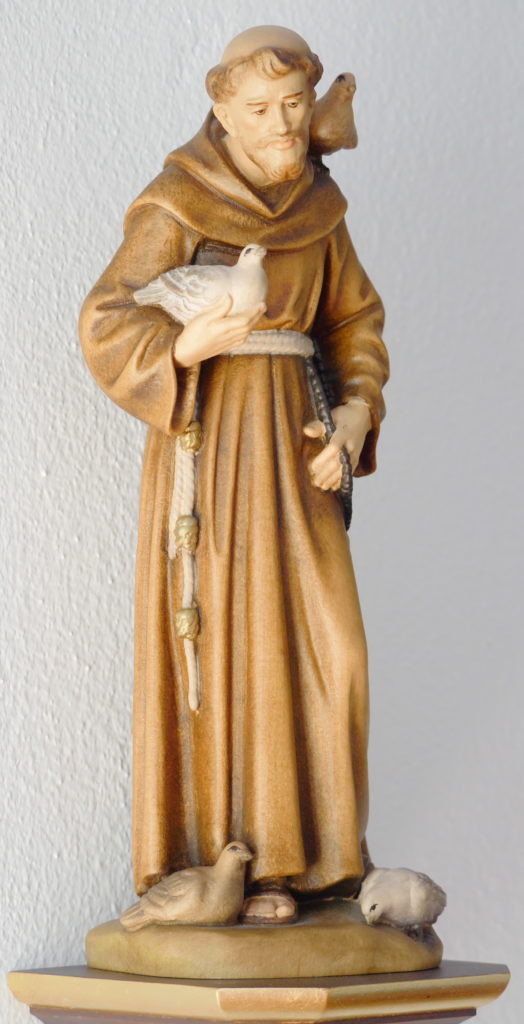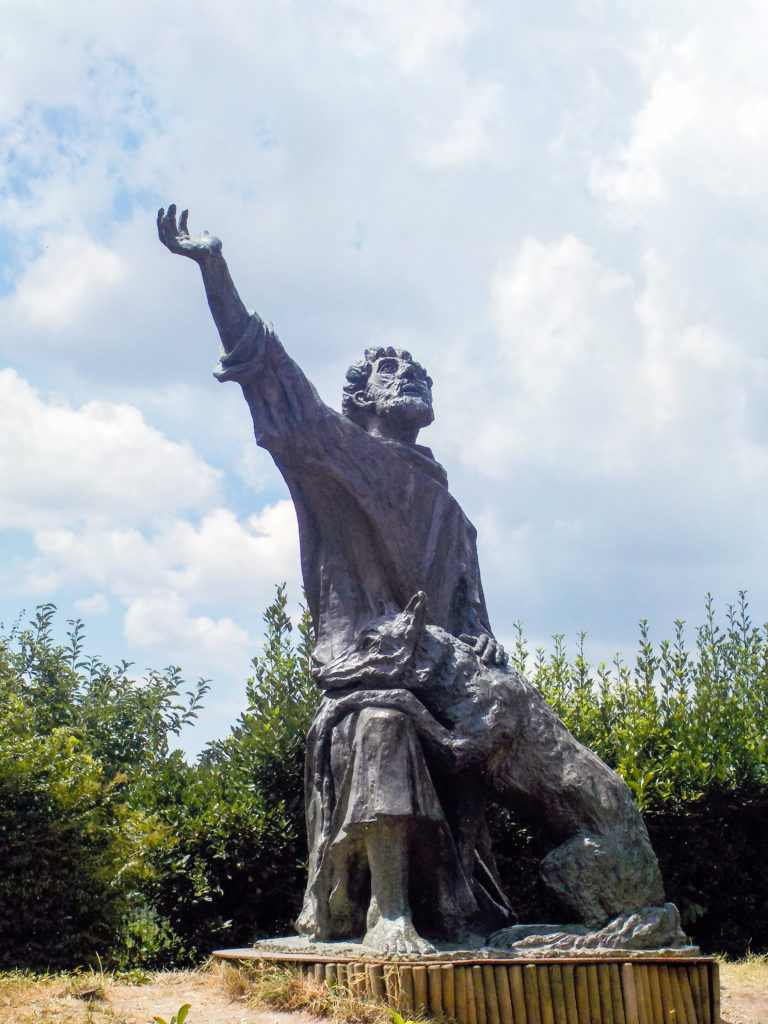No one knows exactly when St. Francis was born, so we need to celebrate his role as patron saint of ecology on the next best thing—his feast day, October 4, which commemorates his death in 1226 (actually, he died near midnight on October 3, but the Catholic Church has chosen the next day to honor him).
The man who would become St. Francis was born as Giovanni di Bernardone in 1181 or 1882 in Assisi, Italy. When his father returned from a business trip to France to find he had a son, he re-named him Francesco, or Francis as he was known then and since. The son of a wealthy merchant, he entered adulthood in the lap of luxury. He loved the good life, known for his high spirit and devotion to parties. He also sought adventure and fame as a soldier and was once a prisoner of war. He also loved the outdoors and nature.

Still as a young man, Francis received several visions that made him abandon his hedonistic ways and become a devout Christian. When asked if he would marry, he replied “Yes, I am about to take a wife of surpassing fairness.” He meant poverty, a commitment he continued throughout his life, forsaking his inheritance and living always in the most humble manner. He often slept outdoors or in caves, and his clothing was a simple tunic tied around the waist by a rope. Once when robbed by road criminals and left with no resources, he declared himself happy and free to follow a life of poverty and spiritualism.
His role as a spiritual leader expanded as he pursued his mission. He founded three Catholic orders, including the Franciscan Order named after him. He gathered followers as he rebuilt churches, helped the poor and declared the sanctity of all life. The principle of sanctity for all of god’s creations, whether human, animate or inanimate, is the source of his reputation as a lover of nature. He believed that since god had created all, then all were kin. His meaning was clear in his “Canticle for the Sun” (or Canticle for the Creatures, as it is also known):, which reads in part:
“Praised be you, my Lord, with all Your creatures,
especially Sir Brother Sun,
who is the day and through whom You give us light,
and he is beautiful and radiant with great splendor;
and bears a likeness of You, Most High One.
Praised by You, My Lord, through Sister Moon and the stars,
In heaven You formed them clear and precious and beautiful.
Praised by You, my Lord, through Brother Wind,
and through the air, cloudy and serene, and every kind of weather
through whom You give sustenance to Your creatures.
Praised by You, my Lord, through Sister Water,
who is very useful and humble and precious and chaste.
Praised by You, my Lord, through Brother Fire,
through whom You light the night,
and he is beautiful and playful and robust and strong.
Praised by You, my Lord, through our Sister Mother Earth,
who sustains and governs us,
and who produces various fruit with colored flowers and herbs.

He was considered then (and now) as the most conscientious follower of the principles of Jesus of Nazareth to leave behind worldly goods and follow the spirit. He was beatified as St. Francis in 1226, only two years after his death.
He loved nature, and many stories relate to how he could commune with birds (he called them “little brethren the birds”) and other animals. And so has grown the image of St. Francis of Assisi as the symbol of a loving relationship with nature. So strong is his example that in 1979, Pope John Paul II formally named St. Francis as the “Patron Saint of Ecology.”
Long before this, however, the broader world took note of St. Francis’ meaning to the protection of the earth and biodiversity. In 1931, the International Animal Protection Congress in Florence (just a short distance from Assisi) adopted October 4 as World Animal Day, choosing the date because it was the Feast Day of St. Francis of Assisi.
World Animal Day has been celebrated ever since. The mission of World Animal Day is “to raise the status of animals in order to improve welfare standards around the globe.” The celebration covers all animals, wild and domestic. In recent years, more than 1000 events have been held in more than 100 countries annually.
So, whether you prefer to recognize October 4 as World Animal Day or the Feast Day of St. Francis of Assisi, keep the ideals of both in your heart and hands.
References:
Custodia Terrae Sanctae. Franciscan Texts. Available at: https://www.custodia.org/en/franciscan-texts. Accessed August 12, 2019.
Franciscans for Ecology. Papal Declaration of Francis as Patron of Ecology. Available at: https://francis35.org/english/papal-declaration-francis-patron-ecology/. Accessed August 12, 2019.
New Advent. St. Francis of Assisi. Available at: http://www.newadvent.org/cathen/06221a.htm. Accessed August 12, 2019.
World Animal Day. About World Animal Day. Available at: https://www.worldanimalday.org.uk/about_us. Accessed August 12, 2019.
